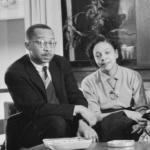Nicolae: The Rise of Antichrist; pp. 282-285
“Rayford Steele was having a crisis of conscience.”
Finally. It was just a few days ago in this story that Rayford Steele landed the Antichrist’s personal jet at San Francisco International Airport. He’d been listening in on his secret eavesdropping device and he knew that, as soon as the plane took off again, Nicolae Carpathia would order his air force to destroy the entire Bay Area with nuclear weapons. Rayford watched as the co-pilot and flight crew left the plane there in San Francisco and he knew they were all doomed. Yet he said nothing — not to them or to anyone.
He knew that hundreds of thousands, perhaps millions, of people were about to be killed, and yet he hadn’t tried to warn them, he hadn’t tried to stop it from happening. He hadn’t done anything.
This crisis of conscience seems long overdue.
But that’s not what Rayford’s crisis of conscience is about. He has yet to express any guilt about that. What he feels guilty about, rather, is his marriage. He feels guilty that it’s going so well:
Rayford missed Amanda. In many ways, they still seemed strangers, and he knew that in the little more than five years before the Glorious Appearing, they would never have the time to get to know each other and develop the lifelong relationship bond he had shared with Irene. For that matter, he still missed Irene. On the other hand, Rayford felt guilty that in many ways he was closer to Amanda already that he had ever been to Irene.
So he’s not guilty about silently standing by, or even about compliantly assisting with the nuclear annihilation of several cities and millions of their inhabitants. Rather, Rayford’s conscience is bothered because he’s being such a spiritually awesome husband to Amanda that he “felt guilty” he hadn’t been just as awesome with Irene.
That was his own fault, he knew. He had not known nor shared Irene’s faith until it was too late. She had been so sweet, so giving. While he knew of worse marriages and less loyal husbands, he often regretted that he was never the husband to her that he could have been. She deserved better.
What follows, then, is a long description of how the new, born-again Rayford is now a model husband to Amanda. Rayford begins to reminisce about meeting Amanda and about their cautious, church-based courtship.
 This is a welcome tangent for readers. Amanda arrived in this story with little introduction. She just kind of showed up, like Cousin Oliver on The Brady Bunch. Her relationship with Rayford developed off-screen, during the “Eighteen months later” time-skip toward the end of the second book, so even though she’s been around by now for a few hundred pages, readers still don’t know very much about her.
This is a welcome tangent for readers. Amanda arrived in this story with little introduction. She just kind of showed up, like Cousin Oliver on The Brady Bunch. Her relationship with Rayford developed off-screen, during the “Eighteen months later” time-skip toward the end of the second book, so even though she’s been around by now for a few hundred pages, readers still don’t know very much about her.
Part of the reason I think I’ve personally had a hard time warming up to Amanda is that the first and primary attribute we’ve learned about her is that she’s in love with Rayford Steele. That seems more of a character liability than an asset. In Chloe’s case, I’m able to look past her inexplicable affection for Buck Williams because she existed as a character prior to and apart from that relationship. We’ve encountered hints of an actual character there — “meta-Chloe” — struggling to assert herself between the lines of the book. We saw the smart young woman who challenged Bruce Barnes’ platitudinous Bildadism and his horrific notion of God’s character — even if the authors then abruptly forced her to abandon that argument, without explanation.
With Amanda, though, all we know is that she admires Rayford. And thus, because Rayford is not in any way admirable, we cannot trust her judgment or respect her character.
Rayford’s little trip down memory lane, then, might have served to re-introduce Amanda as a person — as someone we could identify and evaluate as something other than merely the second Mrs. Steele.
But that’s not what the authors give us here. What this is, rather, is a little homily on the proper role and virtues of a godly Christian wife — a passage that seems so didactic and so designed for small-group Bible study lessons that I’m surprised it didn’t come with “Questions for further reflection” at the end of it.
This homily isn’t purely instructional, though. It also serves a defensive function. The authors here are checking off boxes to satisfy their intended audience’s potential concerns about their respect for traditional marriage. That’s why so much of what we read here about the church-based courtship of Rayford and Amanda is framed negatively — a reassurance that it was not anything that any good Christian reader might disapprove of.
To Rayford, Amanda was a gift from God. He recalled not even having liked her at first. A handsome, wealthy woman slightly older than he, she was so nervous upon first meeting him that she gave the impression of being a jabberer. She didn’t let him or Chloe get a word in, but kept correcting herself, answering her own questions, and rambling.
Jerry Jenkins tells us there about a scene he didn’t bother to write, but my reaction to this un-shown scene seems to be the opposite of Rayford’s as I found it to be the most endearing thing I’ve yet read about Amanda. I’m picturing Emily Gilmore talking like her daughter, which strikes me as delightful. Rayford and the authors don’t seem to share my affection for quality jabbering.
Rayford and Chloe were bemused by her, but* seeing her as a future love interest never crossed his mind. They were impressed with how taken Amanda had been with Irene from her brief encounter. Amanda had seemed to catch the essence of Irene’s heart and soul.
We’ve already been told, repeatedly, that Irene Steele was the model of perfection as the faithful, “biblical,” womanly wife. So when we read that Amanda has caught “the essence” of Irene’s being and identity, what we’re being told is that Amanda is also a perfect, faithful, womanly wife.
And that changes the meaning of everything else we’re about to read about her. It’s no longer something we’re reading to learn about Amanda White, the human being, but becomes instead a description — or list — of the attributes of the Good Christian Wife. This seems less like it’s intended to give readers a better understanding of Amanda as an individual than it is about using Amanda as an object lesson in How To Be A Godly Wife, according to Tim LaHaye and Jerry Jenkins:
[Rayford] watched how she assimilated herself into New Hope Village Church. She was cordial to him, but never inappropriate, and never — in his mind — forward. … Amanda did not come off as a flirt to anyone. She quickly became known around New Hope as a servant. That was her spiritual gift. She busied herself about the work of the church. She would cook, clean, drive, teach, greet, serve on boards and committees, whatever was necessary. A full-time professional woman, her spare time was spent in church life. …
From a distance, having hardly socialized with her after that first encounter when she merely wanted to talk to him and Chloe about Irene, Rayford became an admirer. He found her quiet, gentle, giving spirit most attractive. When he first found himself wanting to spend time with her, he still wasn’t thinking of her romantically. He just liked her. Liked her smile. Liked her look. Liked her attitude. …
If that’s supposed to be about Amanda, then why does every word of it work just as well as a description of Loretta? If that’s why Rayford fell in love with Amanda, then why hadn’t he previously fallen in love with Loretta? Is it because, despite having a “quiet, gentle, giving spirit,” she wasn’t also “handsome” and “wealthy”?
Note that this little sermon on the Good Christian Wife is addressed to male and female readers in different ways. For the men, it’s meant to instruct them on what they should be looking for in a GCW — a quiet, submissive servant. For the women, it’s meant to instruct them on how to go about winning the heart of a Good Christian Man and thereby getting themselves a Good Christian Husband. Just put your head down, keep quiet, cook, clean, and serve and the fellas will become admirers who eventually realize they’ve fallen in love. (The clumsy sexism of all of this is infuriating, but I think what angers me more is the possibility that some goodhearted innocent Eleanor Rigby might read this admonition and mistake it for practical advice.)
So despite three pages of Rayford dwelling on how he first met and fell in love with Amanda, we haven’t actually learned anything about Amanda in particular at all. Instead, we’ve just gotten a description of the authors’ idea of a generic church-y woman who submissively does generic church-y stuff.
It’s interesting that this church-y stuff is described in such vague terms. “The work of the church” apparently involves a lot of cooking and cleaning and driving. And there are “boards and committees” that do, you know, board and committee stuff. The authors suggest that they, like Rayford, admire Amanda’s willingness to be a “servant,” but they still seem bored by whatever that might involve — no less able to imagine the work itself whether it’s Amanda or Loretta who’s doing the service.
It’s also strange that this generic description of “the work of the church” at New Hope is no different, in any way, from a similarly generic description of the work of a church here today in our non-Rapture world. Really? This is a brand new congregation of very recent converts living in the extravagantly supernatural world of the Great Tribulation. Every one of them has lost every child they ever knew. Every one of them knows, with certainty, that their church, their jobs, their community, their lives and their entire universe will end in about five years. The city in which most of them work has just been destroyed in a nuclear war, and they know that some day soon — in a few weeks or months at the most — a massive earthquake will kill millions and destroy their towns and homes, followed by a series of escalating global calamities. And sometime soon they’ll all be forced to take the Mark of the Beast or else they’ll face imprisonment, potential execution, and will be prohibited from working or from purchasing anything anywhere.
I’ve joked a lot here about the way the inner-inner-circle of the “Tribulation Force” has insulated and isolated themselves from the rest of the congregation and activity at New Hope. That tempts me to imagine that Rayford, Buck, Chloe and Bruce were simply unaware of the way their fellow church members must surely be busily preparing for the days ahead. The Trib Force members condescendingly admire “servants” like Loretta, but they’re so wholly ignorant of what their service entails that I imagine it’s possible Loretta has been frantically prepping the congregation for the worsening Tribulation — stockpiling water, canned goods and ammunition; setting up a black market network to skirt the Mark of the Beast; coordinating training in First Aid, emergency response, earthquake preparedness and post-Wormwood water filtration.
It’s true that nothing we’ve read even hints that this is what Loretta or the other congregants with their “boards and committees” are up to, but it’s also true that nothing we’ve read hints that Rayford or Buck or the authors would be aware if it was. And since it would be suicidally foolish for the people of New Hope not to be busily doing all of that, it makes more sense to just assume they are.
– – – – – – – – – – – –
* This battle is probably lost, but let me still point out that “bemused” and “amused” have not always been synonyms. Even now, dictionaries still insist on defining “bemused” as bewildered, perplexed and baffled. They haven’t yet caught up with the current usage, in which it tends to mean something like a cross between “amused” and “bewitched.”
That’s the sense in which Jenkins seems to be using it here, hence the but in “but seeing her as a future love interest never crossed his mind.” Per the dictionary, that sentence ought to say “and seeing her as a future love interest,” but Jenkins writes “but,” thereby implying that being bemusing is something akin to being wild again, beguiled again, bewitched, bothered and bewildered.
















